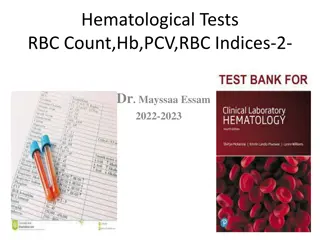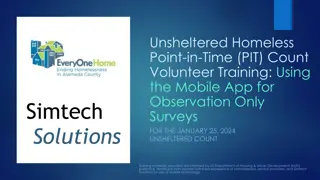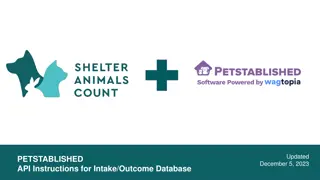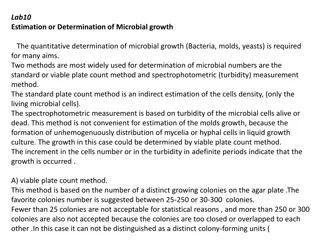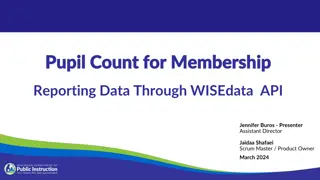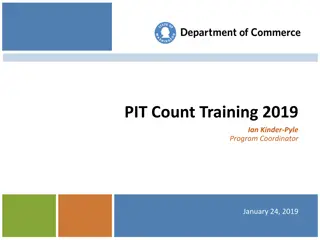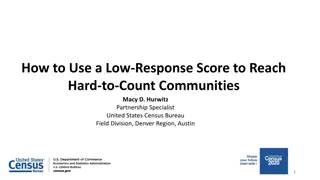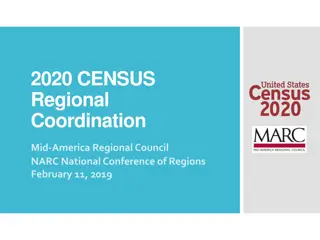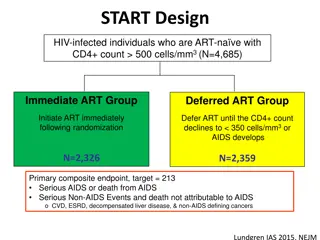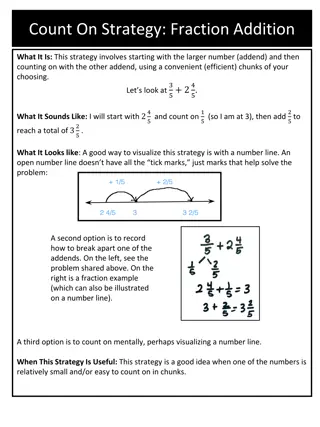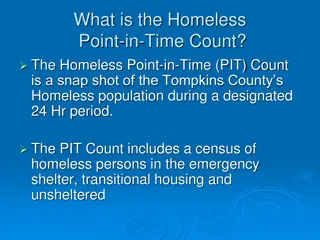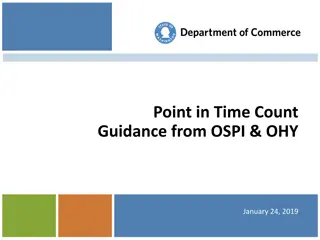Differential white blood cell count
Differential white blood cell count, also known as a leukocyte count, is a crucial test to determine the different types of white blood cells present in the blood. The cells are classified into granulocytes (neutrophils, eosinophils, basophils) and agranulocytes (lymphocytes, monocytes). Blood smear
3 views • 21 slides
Understanding Red Blood Cell (RBC) Count and Its Significance in Blood Health
Red blood cells, comprising nearly 45% of blood volume, play a crucial role in oxygen transport. The red blood cell count, measured as the number of cells per unit volume of blood, helps assess the adequacy of oxygen-carrying capacity. Normal values vary by age and gender. The experiment aims to det
8 views • 16 slides
Buy Kinder JOY Eggs Boys, Wrapped Bulk Chocolate Candy Eggs 24 Count With Toys Inside
About This Item\n\nBulk 24 Count Package \u2014 Kinder Joy Eggs Boys Are A Great Surprise For Trick Or Treat Bags, Gifts, And Halloween Party Favors For Boys And Girls\n\nEach Iconic Kinder JOY Egg Holds A Delicious Treat On One Side And A Fun Toy On The Other, Perfect For Filling The Halloween Cand
3 views • 3 slides
Understanding ABS Voter Boards and Key Players in Election Administration
Learn about ABS basics and terms, qualifications for ABS Voter Board and Central Count Team members, responsibilities of key players like County Chairs and Clerks, and the essential tasks performed by ABS Voter Boards and Central Count Teams in election processes as presented by Angie Nussmeyer at t
8 views • 9 slides
Hematological Tests RBC Count,Hb,PCV,RBC Indices-2-
Hematological tests play a crucial role in assessing blood health. This guide covers the significance of RBC count, hemoglobin levels, PCV, and RBC indices. It explains the photometric technique for measuring hemoglobin, visual methods for analysis, sample hemoglobin level reference ranges, and insi
3 views • 20 slides
Unsheltered Homeless PIT Count Volunteer Training using Mobile App
The volunteer training for the January 25, 2024, Unsheltered Count involves using a mobile app for observation-only surveys. Training materials are based on HUD guidance and feedback from those with lived homelessness experience. Volunteers will be assigned locations to canvas and conduct surveys us
0 views • 7 slides
Streamline Your Data Reporting Process with PETSTABLISHED API Integration
Simplify your monthly data reporting to Shelter Animals Count by setting up automatic data transfer using PETSTABLISHED API. Follow the detailed instructions to opt-in on the Shelter Animals Count Portal and activate the API in your Petstablished account. Ensure accurate data transmission by verifyi
0 views • 8 slides
Understanding Differential Leucocyte Count for Blood Disorders
Differential Leucocyte Count (DLC) is crucial for diagnosing blood-related disorders by analyzing the distribution and morphology of white blood cells. Dr. Versha Prasad explains the significance, normal values, and various conditions like neutrophilia, lymphocytosis, monocytosis, and basophilia. Th
1 views • 15 slides
Understanding WBC Differential Count in Blood Analysis
WBC (white blood cell) count is essential in assessing a patient's health. A differential count helps determine the percentage of different types of white blood cells. This analysis can provide important insights into various health conditions like infections, allergies, and systemic illnesses. The
1 views • 9 slides
Methods for Determination of Microbial Growth
Quantitative determination of microbial growth is crucial for various purposes, with two commonly used methods being the standard plate count and spectrophotometric measurement. The standard plate count method estimates living microbial cell density, while spectrophotometric measurement relies on tu
2 views • 6 slides
Buckinghamshire Claimant Count Analysis - June 2023
This report provides a detailed analysis of the Buckinghamshire Claimant Count for June 2023, highlighting key statistics such as the total number of claimants, changes from previous months, claimant rates, and comparisons to national averages. The data presented sheds light on the impact of the Cov
0 views • 13 slides
Understanding White Blood Cell Count and Measurement Methods
White blood cell count measures the number of white blood cells in a specific volume of blood, indicating infection or disease progression. The normal range is 5000-11000 cells/cubic mm, varying with age. Methods include manual and electronic counting using specific instruments. Materials like antic
0 views • 14 slides
Understanding Platelet Count and its Importance in Blood Clotting
Platelets, also known as thrombocytes, play a crucial role in blood clotting. This article explains the structure and lifespan of platelets, the purpose of performing a total platelet count, and the principle of counting platelets using a hemocytometer. It also describes the components used for plat
0 views • 20 slides
Understanding Red Blood Cell Count Methods
Explore the principles, normal ranges, and conditions related to red blood cell count. Learn about the apparatus and materials needed for RBC counting, as well as the procedure involved. Understand how changes in RBC count can indicate various health conditions like polycythemia and anemia.
0 views • 27 slides
Estimation of Dead-Time Loss for Neutron Count-Rates
This study discusses the estimation of dead-time loss for high neutron count-rates and the associated multiplicity correction using multi-channel list-mode data. The numerical method for high count-rate dead-time correction in neutron multiplicity counting is described, focusing on the use of multi-
0 views • 6 slides
Efficient Strategies for Annual Physical Inventory Procedures
Explore key insights on conducting an annual physical inventory efficiently. Discover tips on prioritizing inventory counts, addressing truck discrepancies, and managing moving parts during the process. Stay informed about crucial terminology like Book Count and Count Quantity for accurate inventory
1 views • 32 slides
Point-in-Time Count of Unsheltered Persons Experiencing Homelessness - Volunteer Training Overview
Point-in-Time Count (PIT) is crucial for understanding and addressing homelessness. This volunteer training provides insights into counting unsheltered individuals, gathering demographic data, and why PIT counts are conducted. It emphasizes the importance of measuring trends, strategizing resource a
1 views • 40 slides
Sacramento CoC 2022 Unsheltered PIT Count Summary & Updates
Examining the preliminary findings of the 2022 Sacramento CoC Unsheltered Point-in-Time (PIT) count, this report discusses volunteer efforts, areas covered, and involvement of professional outreach partners. The document outlines future steps, including surveys, data analysis, and planning for the n
0 views • 12 slides
Understanding Interconnect Topology Design and Performance Metrics
Interconnect topology design plays a crucial role in determining the cost and performance of a network. Factors such as the number of switches and links, switch port count, network layout, throughput, packet latency, average hop counts, nodal degree, hop count, and diameter are essential considerati
0 views • 38 slides
Understanding Interconnection Networks Topology
Exploring the topology of interconnection networks helps determine the arrangement of channels and nodes, impacting network cost, performance, latency, energy consumption, and complexity of implementation. Abstract metrics such as degree, hop count, and network diameter play crucial roles in evaluat
1 views • 56 slides
Comprehensive Overview of Pupil Count Reporting in WISEdata API
This presentation covers the reporting requirements for pupil count membership data through the WISEdata API, including agenda details, an extended timeline, reasons for the pilot project, and insights into how the Pupil Count Module in WiSFiP works. It also discusses the reporting needs for 2024, t
3 views • 31 slides
Understanding PIT Count Training for Homeless Population
This content provides insights into the PIT Count Training 2019 aimed at understanding and addressing homelessness. It covers topics such as unsheltered and sheltered counts, individuals included and excluded in the PIT count, and strategies to address subpopulations. Additionally, it clarifies what
2 views • 18 slides
Strategies for Reaching Hard-to-Count Communities Using Low-Response Score
Explore how to leverage a low-response score to engage with hard-to-count communities effectively. Learn about ROAM mapping tool, the 2020 Census goal, and the significance of Low Response Score (LRS) in identifying areas for targeted outreach. Discover hard-to-count variables and how to utilize dat
0 views • 14 slides
Importance of Census 2020 for Fair Representation and Federal Funding
The Census 2020 regional coordination by Mid-America Regional Council and NARC highlights the significance of achieving a complete count for fair allocation of over $675 billion in federal funding across 132 programs. Challenges include distrust of government, mobility of population, and reaching ha
0 views • 15 slides
Clinical Trial Comparison of Immediate vs Deferred Antiretroviral Therapy in HIV-Infected Individuals
This study compared immediate initiation of antiretroviral therapy (ART) with deferred treatment in HIV-infected individuals with CD4+ count >500 cells/mm3. Results showed a significant reduction in primary composite endpoint events in the immediate ART group compared to the deferred ART group. Seri
0 views • 4 slides
Cold Weather Pit Count Coordinator Module 3 Planning for Success
Cold weather presents challenges for conducting pit counts to address homelessness. Visibility of homelessness decreases in cold weather, making locating individuals more challenging. Planning ahead with contingency dates, volunteer coordination, and route planning is crucial for success in cold wea
0 views • 11 slides
Efficient Strategies for Fraction and Decimal Addition and Subtraction
Utilize the Count On and Count Back strategies to simplify fraction and decimal addition and subtraction. Start with the larger number and count on with the other addend or break apart the subtrahend into manageable chunks. These visual and mental approaches enhance calculation efficiency and accura
0 views • 4 slides
Understanding the 2022 Point-in-Time (PIT) Count of Persons Experiencing Homelessness
Learn about the significance of the annual Point-in-Time Count (PIT) conducted to measure homelessness trends, the distinction between sheltered and unsheltered counts, the guiding principles of the count, its purpose, and the specific locations where unsheltered individuals may be found. Explore wh
0 views • 44 slides
Point-In-Time Count Strategies for Homelessness Assistance
Snapshot of homeless individuals in a community on a single day to plan services, measure progress, and identify needs, strengths, and gaps. Process involves selecting a PIT lead, forming a committee, training volunteers, and counting individuals in various settings. Differentiates between who to co
0 views • 32 slides
Count on Me - Lyrics by Bruno Mars
Bruno Mars' song "Count on Me" is a heartfelt message about always being there for a friend in need. The lyrics express the unwavering support and friendship between two individuals, emphasizing the importance of being a pillar of strength and comfort. The song conveys a sense of loyalty and reassur
0 views • 8 slides
Buckinghamshire Claimant Count Analysis March 2023
This report provides insights into the Claimant Count and Alternative Claimant Count in Buckinghamshire for March 2023. The data reveals an increase in the number of residents claiming out-of-work related benefits compared to previous months, with detailed breakdowns by parliamentary constituencies.
0 views • 15 slides
Buckinghamshire's Claimant Count Analysis February 2021
This report provides a detailed analysis of Buckinghamshire's Claimant Count and Alternative Claimant Count for February 2021, based on data from the Department for Work and Pensions. It includes insights on claimant trends, rates, and comparisons to national and other regional statistics.
0 views • 17 slides
Canon Oc Copier Copy and Scan Count Instructions
Follow these steps to enter the copy and scan counts for your new Canon Oc copier. Start by entering the copier serial number, then press the Counter Check button to view the current copy count. Next, check the Scan Count by totaling the black and white scans with color scans. Use the provided image
0 views • 6 slides
Summary of Buckinghamshire's Out-of-Work Benefits Claimant Count
This report provides a summary of the number of Buckinghamshire residents claiming out-of-work related benefits (the Claimant Count). In July 2024, 10,520 Buckinghamshire residents were claiming these benefits, reflecting an increase from the period before the Covid-19 pandemic. The Claimant Count r
0 views • 11 slides
State Agency Annual Caseload Count Process for Title I Part D Programs
State agencies participate in an annual caseload count process for Title I Part D programs to determine funding allocations. The process involves a one-day count of students in HHS and Dept. of Corrections programs, with specific guidelines for data collection and reporting.
0 views • 9 slides
Buckinghamshire's Out-of-Work Benefits Claimant Count January 2023 Report
This report provides a monthly summary of Buckinghamshire residents claiming out-of-work related benefits, detailing the Claimant Count and Alternative Claimant Count for December 2022. It includes statistical data analysis, trends, and comparisons to national averages, offering insights into the im
0 views • 15 slides
Overview of Homeless Point-in-Time Count in Tompkins County
Homeless Point-in-Time (PIT) Count in Tompkins County provides a snapshot of the homeless population within a 24-hour period, including those in emergency shelters, transitional housing, and unsheltered locations. It is conducted annually to gather data on the number and demographics of homeless ind
0 views • 27 slides
Overview of Special Education Child Count October 2016
Introduction to the Special Education Child Count process conducted annually in October, collecting data for state and federal reporting purposes, impacting funding allocations based on the count. The data review process, including checks for ensuring quality data, eligibility documentation, IEP fin
0 views • 12 slides
Point-in-Time Count Guidance and Overview from OSPI & OHY
The content provides information about the Point-in-Time Count Guidance from OSPI & OHY on January 24, 2019. It includes an agenda overview, details on unsheltered and sheltered counts, involvement of local school districts, and how schools can support the PIT Count. The guidance emphasizes the impo
0 views • 34 slides
Understanding Complete Blood Count (CBC) Testing
Complete Blood Count (CBC) is a crucial test that provides information about the composition of a patient's blood, including red blood cells, white blood cells, and platelets. This test helps in diagnosing conditions such as anemia, infections, and more. CBC involves analyzing parameters like RBC co
0 views • 20 slides




